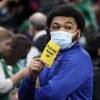A consortium of six Boston area hospitals and health care systems announced a new multi-year study of long-lasting COVID-19 symptoms on Monday. The study will seek to untangle a wide range of debilitating symptoms faced by "long haulers," or COVID patients who never fully recover from their infection.
The three-year study, called the Greater Boston COVID Recovery Cohort, starts this year and will enroll about 1,000 participants, said Dr. Bruce Levy, lead investigator for the study and chief of the Pulmonary and Critical Care Medicine Division at Brigham and Women’s Hospital.
Levy said the researchers also hope to start finding the best ways to prevent and treat long COVID, whose symptoms can range from mild to incapacitating, including fatigue, shortness of breath, “brain fog," sleep disorders, fevers, gastrointestinal symptoms, anxiety and depression.
While it’s still unclear how many people are at risk for the syndrome, Levy said it's estimated that up to 30-40% of people who become infected could be at risk for developing long COVID.
“The lower numbers are more in the 5% range,” Levy said, “and we don't know exactly where that will lie. But I will say that, with roughly 80 million infections in the US with COVID, even if only 1% of those patients end up with long COVID, it's still a very large number.”
In addition to Brigham and Women’s Hospital, the Boston area study includes researchers from Beth Israel Deaconess Medical Center, Boston Medical Center, Cambridge Health Alliance, Tufts Medical Center, and Massachusetts General Hospital.
The local study is part of a national initiative announced last month by the National Institutes of Health that includes 15 collaborations like the one in Boston and will enroll some 20,000 adults and 20,000 children nationwide, backed by $1.15 billion in research funding from Congress.
Boston’s consortium will be putting an emphasis on health equity in their study, with planned collaborations and input from Black and other communities that have been hit hardest by the pandemic.
Janice John, a primary care clinician at Cambridge Health Alliance and a study investigator, said many of CHA’s 130,000 patients are from marginalized communities, and that they've also been harder hit by long COVID.
“Help is coming and there is a lot of energy being put into figuring out what can work for people to help them to get better,” John said. “I just watched patient after patient relax in the room because someone is believing them, telling them, ‘We don't understand it, but this is real. And your suffering is real, and I'll walk with you in this.’”
WATCH: Researching the effects of long COVID
Maria Novicki of Lebanon, Maine, is joining the Boston area study. She lost her job to the health effects of long COVID, which for her have included permanent loss of taste and smell as well as cognitive and neurological impairments.
“I remember what I went through at the beginning stages — I couldn't find the help, people didn't believe me, doctors were just pushing me along,” Novicki said. “So me doing this, it's not to help myself, it's more because I know the battle I went through… it's helping me to help others.”
Novicki said she and others with long COVID are hoping the Boston study will help them get answers to some of the many questions surrounding the syndrome.
“Because who knows how long [the pandemic] is going to last?” she said. “They say it's dying down, but it could come right back. That's another thing a lot of long-haulers are afraid of. We are afraid of getting sick again, because we don't know what the virus could do to us again."







